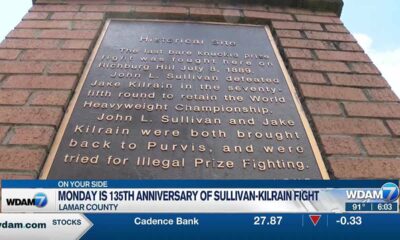Mississippi Today
Judge: Juries, not judges, should rule on officers’ ‘bad acts’
Desmond Green spent about two years behind bars charged with a capital murder he didn't commit.
A Jackson police detective “used a lying, drug-impaired jailhouse informant to lock Green up,” U.S. District Judge Carlton W. Reeves wrote Monday in response to Green's 2023 lawsuit. “The detective also steered the informant to select Green's face from a photo lineup. It was a horrifying wrong.”
Reeves wrote that the horror continued in the Hinds County Detention Center, which was “full of violence, rodents, and moldy food. He says there was ‘constant yelling, fighting and threats.' Green ‘often did not have a mattress, or even a pad, to sleep on, and slept on the floor.' He ‘constantly feared for his life.'”
The informant recanted. The state dropped the charges, but the ordeal still cost Green about two years in jail.
Last year, he filed a lawsuit against the city of Jackson and others.
“Green filed this lawsuit to seek justice for those two wrongs — his prosecution and conditions of confinement,” Reeves wrote. “He has sued the detective who locked him up, her employer (the City of Jackson, Mississippi), and the operator of the Hinds County Detention Center.”
Now, the judge wrote, Green is “on the precipice of being wronged a third time. Not by a rogue officer or jailer, but by the law itself. Because the detective says the legal doctrine of qualified immunity requires the Court to dismiss Green's claims against her.”
“Qualified immunity is an unconstitutional error. It is past time for the judiciary to correct this mistake.”
— U.S. District Judge Carlton W. Reeves
In his Monday decision, Reeves paved the way for the lawsuit to go forward. He rejected defense claims that the litigation should be dismissed because of the qualified immunity doctrine, which the U.S. Supreme Court created in 1967.

That doctrine “means persons wronged by government agents cannot sue those agents unless the Supreme Court previously found substantially the same acts to be unconstitutional,” the judge wrote. “A cynic might say that with qualified immunity, government agents are at liberty to violate your constitutional rights as long as they do so in a novel way.”
But Green didn't stop at suing for justice and damages. He wants to bring an end to qualified immunity, and many lawyers, professors and judges have sided with him.
“The Court agrees with these calls for change,” Reeves wrote. “Congress's intent to protect citizens from government abuse cannot be overridden by judges who think they know better. As a doctrine that defies this basic principle, qualified immunity is an unconstitutional error. It is past time for the judiciary to correct this mistake.”
On Feb. 13, 2020, someone shot Nicholas Robertson, who knocked on the door of Avery Forbes' home in Jackson and died there.
Two months later, police arrested Samuel Jennings on an unrelated charge. He told police that Desmond told him that he had killed Robertson.
The accusation stunned Green, who told police he didn't know Robertson, much less take part in his murder.
Despite that, Detective Jacquelyn Thomas and Hinds County prosecutors encouraged the grand jury to indict Green, who was jailed without bond.
Two years later, Jennings recanted, blaming the statement on meth abuse and told authorities he suffered from a variety of mental issues. He said he initially pointed to the first photo in a photo lineup, only to have the detective steer him instead to the fifth photo, which was Green.
As a result, prosecutors remanded the case to the file, and Green finally went free in 2022.
Green worked as a brick mason before suffering a series of tragedies. He had 28 inches of his colon removed because of diverticulitis. His mother died of kidney failure, and his father had stage 4 lung cancer that went into his brain.
“They died seven months apart,” said his sister, Jackie.
After that, Green was jailed in 2020 for capital murder in the killing of Robertson, a man he said he never knew and never met.
On the night of the homicide, he said, “I was at home, trying to do everything you do to not be in trouble. I was at home in my bed, asleep.”
Despite that, he was arrested, put in jail and refused bond.
Inside the jail, he said he was put on lockdown, sometimes going up to two weeks without a shower.
He lost the home he had for more than seven years, he lost time with his seven children, and he returned home with a limp. “It hurt me to walk,” he said.
His arms remained sore because of all the nights he slept on concrete. “The jail was overcrowded,” he said. “We sometimes had five or six people” to a cell intended for two.
The 43-year-old still suffers from nightmares from his time behind bars. “I saw people murdered in the jail,” he said. “I feel very paranoid, like I'm always being watched. It's hard for me to be around a lot of people.”
He said another charge is still pending against him that he has yet to be indicted for — grand larceny.
“They claimed I was stealing water,” he said, “but that wasn't true.” In reality, he said, there was no water to steal because firefighters shut off his water after his neighbor's home burned down.
Law enforcement officers need to thoroughly investigate before putting people behind bars, he said. “There was no evidence showing I was involved, so why was I arrested?”
The system needs to be improved, he said. “My life was on the line the whole time, and I was never allowed to speak to the judge until two years later. I lost time that I'll never get back.”
Tupelo attorney Jim D. Waide III, who is representing Green, said he thinks Reeves' opinion comes closer than any previous opinion to making the Supreme Court review the doctrine.
In addition to the opinion of Reeves, who was nominated by then-President Barack Obama in 2010, Judge Don R. Willett of the 5th Circuit Court of Appeals, one of then-President Trump's nominees in 2017, has also questioned the doctrine.
In 2018, Willett criticized “the kudzu??like creep of the modern immunity regime” and explaining how the doctrine “smacks of unqualified impunity, letting public officials duck consequences for bad behavior—no matter how palpably unreasonable—as long as they were the first to behave badly.”
In other words, “it's immaterial that someone acts unconstitutionally if no prior case held such misconduct unlawful,” Willett wrote. “Immunity ought not be immune from thoughtful reappraisal.”
In the years following the end of the Civil War, the Ku Klux Klan and other white supremacists “unleashed waves of terrorism across the South,” Reeves wrote.
In response, he wrote that Congress passed the Ku Klux Klan Act of 1871 to help protect Black Americans because state courts “left the terrorism committed by various militant groups seeking control in the South unchecked.”
For decades, he wrote, the high court never recognized a “good-faith immunity,” but that changed when the U.S. Supreme Court ruled in 1967 that Jackson police officers who arrested ministers who entered a whites-only waiting room were immune from litigation because the officers were acting in “good faith.”
In creating this qualified immunity, justices “protected the Southern officials still violating those federal rights 100 years after the War ended,” Reeves wrote. “Southern trees bear strange fruit, indeed. It is difficult to see qualified immunity's creation as anything other than a backlash to the Civil Rights Movement.”
Such “immunity,” he wrote, has led to the protection of correctional officers holding a person naked in a frigid cell, “covered in other person's feces,” police officers stealing $225,000 in cash and rare coins, and police officers killing someone inside a car because “the law clearly established only that an officer would not shoot a person from outside a car.”
Reeves called for judges to let juries decide instead.
Jurors can be instructed that federal law gives people the right to be free “from unconstitutional action under color of state law” and also that unnecessary suits against public officers run the risk of diverting “energy from pressing public issues” and deterring “able citizens from acceptance of public office,” he wrote.
The Constitution is full of such tensions, he wrote. “Its authors in one breath declared all men to be created equal, and in the other calculated a slave to be worth three?fifths of a white person. Contradiction is in America's DNA.”
Jurors “know the difference between those acting properly and those violating others' rights,” he wrote. “Their work confirms that when it comes to fact?finding, ‘anything a judge can do a jury can do better. It takes a special type of arrogance simply to conclude that American jurors cannot.'”
As a citizen, “Desmond Green has suffered two injustices,” the judge wrote. “The judiciary should not impose a third. If qualified immunity would do that, closing the courthouse doors to his claims, then the doctrine should come to its overdue end.”
This article first appeared on Mississippi Today and is republished here under a Creative Commons license.
Mississippi Today
On this day in 1957


JULY 6, 1957

Althea Gibson became the first African American to win the women's singles title at Wimbledon and became the top female tennis player in the world. Just six years earlier, she had become the first black player to compete at Wimbledon.
Born in South Carolina, she grew up in Harlem, where she loved table tennis. A local musician invited her to play tennis, and she became so talented that a year later, she won a local tournament sponsored by the American Tennis Association (formed by African Americans), later winning 12 ATA titles in just 13 years.
Despite her talent, much of the tennis world remained closed off to her. The breakthrough came in 1950 when tennis legend Alice Marble lambasted the sport for barring Gibson from the world's best tournaments. The tennis world opened its doors, and Gibson became a Top 10 player in the U.S.
In 1956, she won the French Open. After winning both the women's singles and doubles at Wimbledon in 1957, she was welcomed with a ticker tape parade in New York City. She went on to win 56 singles and doubles championships before turning pro in 1959.
Although she declared that she never considered herself a crusader, there is no question that she opened the doors for many others. She even tried golf, becoming the first black woman to compete on the pro tour.
After she retired, she was inducted in 1971 into the International Tennis Hall of Fame. She died in 2003 at the age of 77. In 2013, the U.S. Postal Service issued a stamp in her honor. Venus Williams said Gibson has been an inspiration to her and her sister, Serena.
This article first appeared on Mississippi Today and is republished here under a Creative Commons license.
Did you miss our previous article…
https://www.biloxinewsevents.com/?p=372977
Mississippi Today
As heat rises, inmates and staff swelter in Mississippi’s prisons
As of Friday, five of the six locations where Mississippi's prisons are located are under a National Weather Service heat advisory.
And the Mississippi Department of Corrections has no clear timeline as to when it will install air conditioning to bring relief to inmates and staff.
“We are continuing to explore our options to provide air conditioning where possible; however, there is no timetable for that installation at this time,” MDOC spokesperson Kate Head wrote in an email.
One woman incarcerated at the women's prison at the Central Mississippi Correctional Facility in Pearl said relief from the heat is hard to come by and the temperatures inside are worse than outside without any shade or trees. The woman asked not to be named for fear of retaliation.
“It's actually worse (in) here,” she said Tuesday. “The heat just hits you in the face.”
The heat index, also known as what temperature feels like on the body, takes into account humidity and air temperature. Friday's advisory was said to expect index temperatures up to 110.
According to the Centers for Disease Control and Prevention, people who are at an increased risk of heat-related illnesses include those without access to air conditioning, those over the age of 65 and people with chronic conditions – populations that include incarcerated people.
Last year was the incarcerated woman's first summer at the prison, and she witnessed people pass out or experience seizures because of the heat.
Head, the MDOC spokesperson, wrote in an email that the department is taking steps to mitigate the heat by providing incarcerated people with water, ice and fans.

This is similar to what has been done in previous years, but some incarcerated people have said that distribution of ice isn't always regular or enough to support hundreds of people and that fans move hot air around. MDOC did not respond to these concerns Friday.
Air conditioning installation has been completed at the women's prison at CMCF in the church, school and dining areas, the incarcerated woman said. Several weeks ago it was completed in her housing zone, she said, but the AC there has not been turned on.
Tuesday evening, the prison superintendent visited the building where the incarcerated woman lives and told residents the air conditioning would not be turned on for the foreseeable future because it requires a part that is on backorder, the woman said.
The woman has also seen how three emotional support dogs trained by seminary students are moved to air conditioned areas and provided pools of water to stay cool. She doesn't understand how the animals get access to the relief but she and the other women don't.

“We get the short end of the stick on everything,” she said, in reference to how the men at CMCF already have AC and the dogs in the women's prison get access to it.
MDOC did not respond to questions about the air conditioning and the dogs' access to it.
Last year as air conditioning was installed at three-fourths of the Mississippi State Penitentiary at Parchman, Commissioner Burl Cain estimated that by sometime in 2025, AC would be coming Parchman's Unit 29, South Mississippi Correctional Institute in Leakesville and other facilities, so long as funding was available to support those upgrades.
“It just takes a good while to get it all done,” he said in an April 2023 interview with Missisisppi Today. “That's just the way the funding is.”
At Parchman, the heat index was above 130 degrees – within the extreme danger category where a person's risk of heat-related illness is likely – for 25 of the past 72 hours, according to the National Weather Service records.
On four separate instances Wednesday afternoon, the heat index reached 185 at Parchman, according to weather data.
Pictures from Parchman's Unit 29, which doesn't have air conditioning, shows how men have secured 8-inch fans purchased from the commissary to the bars of their cells and placed their mattress on the floor beneath the fan, which some have told advocates is how they get relief from the heat.
The majority of Parchman has had air conditioning since last summer, but Unit 29 is part of the group of prisons that are expected to get AC sometime in the future.
At all prisons, an 8-inch fan is available to buy from the commissary for $29.95, which is among one of the most expensive on the prison's commissary list compiled by The Appeal.
Even if an incarcerated person has a job, Mississippi prison industry jobs can pay between 20 cents and $1.30 an hour, which falls within an estimated national average calculated by the Prison Policy Initiative. The group also estimated regular prison jobs nationwide have an estimated range of 14 cents and 63 cents an hour.
Privately operated Eastern Mississippi Correctional Facility has AC including in its housing units, but family members told advocates that since the end of May, the air conditioning has not been functional.
The maximum daily temperatures in Meridian, where the prison is located, have been above 90 degrees since the end of May, according to the National Weather Service.
Meridian is also under a heat advisory, and within the past three days, the highest heat index was 107 degrees – 95 degrees at 75% humidity, which is in the danger category for heat-related illnesses.
Management and Training Corp. spokesperson Emily Lawhead said technicians have diagnosed problems with air conditioning units and will install new units when they arrive.
“We're working hard to get all AC units back online as soon as possible,” she wrote in an email.
In the meantime, Lawson said cold water and fans are available, and Gatorade is provided to staff and incarcerated people for them to stay hydrated. Swamp coolers are cooling the air in areas where AC units are waiting to be repaired, she said Friday.
Heat in prison is a national issue that Families Against Mandatory Minimums, which represents incarcerated people and their families, and One Voice United, a group representing corrections staff, have teamed up to address.
The Safer Prisons, Safer Communities campaign is highlighting a nationwide crisis through overcrowding, understaffing and deteriorating conditions that make prisons unconducive to rehabilitation and create poor conditions for incarcerated people, prison staff, families and communities.
Andy Potter, executive director of One Voice United and a former Michigan corrections officer, recognizes prison infrastructure can be old and it can be expensive to install air conditioning.
But he said it's not enough for incarcerated people and the corrections staff to rely on fans, water bottles and Gatorade to stay cool. The incarcerated and staff do not have the freedom or ability to seek relief in a similar way as those not in a prison system can do, Potter said.
Daniel Landsman, vice president of policy for FAMM, said air conditioning can help decrease incidents of violence and fatalities, which research has found increases with heat.
“Heat is just going to make all the things we are experiencing in our prison system worse,” he said.
This article first appeared on Mississippi Today and is republished here under a Creative Commons license.
Mississippi Today
On this day in 1827


JULY 5, 1827

A day after those enslaved were freed in the state of New York, 4,000 Black Americans marched along Broadway through downtown streets with a grand marshal carrying a drawn sword. They arrived at the African Zion Church, where abolitionist leader William Hamilton said, “This day we stand redeemed from a bitter thralldom.”
Celebrations took place as far away as Boston and Philadelphia. In New York's capital, Nathaniel Paul, pastor of the First African Baptist Society, declared, “We look forward … (to) when this foul stain will be entirely erased, and this, the worst of evils, will be forever done away … God who has made of one blood all nations of men, and who is said to be no respecter of persons, has so decreed; I therefore have no hesitation in declaring this sacred place, that not only throughout the United States of America, but throughout every part of the habitable world where slavery exists, it will be abolished.”
Among those freed by this act? Sojourner Truth, who was born into slavery and had escaped to freedom just a year earlier. The Fifth of July is still recognized and celebrated in New York City.
This article first appeared on Mississippi Today and is republished here under a Creative Commons license.
Did you miss our previous article…
https://www.biloxinewsevents.com/?p=372793
-
Mississippi News2 days ago
Two inmates escape from Mississippi detention center
-
Local News7 days ago
Hurricane Beryl strengthens into a Category 4 storm as it nears the southeast Caribbean
-
Mississippi News4 days ago
Case hits close to home in Columbus
-
Local News7 days ago
Mississippi sets new laws on Medicaid during pregnancy, school funding, inheritance and alcohol
-
Kaiser Health News4 days ago
KFF Health News’ ‘What the Health?’: SCOTUS Term Wraps With a Bang
-
Our Mississippi Home5 days ago
A Few of Mississippi’s Top Historical Sites to See
-
The Conversation6 days ago
How was popcorn discovered? An archaeologist on its likely appeal for people in the Americas millennia ago
-
Mississippi Today6 days ago
Podcast: State Democratic Chair Taylor remains committed to Biden


































